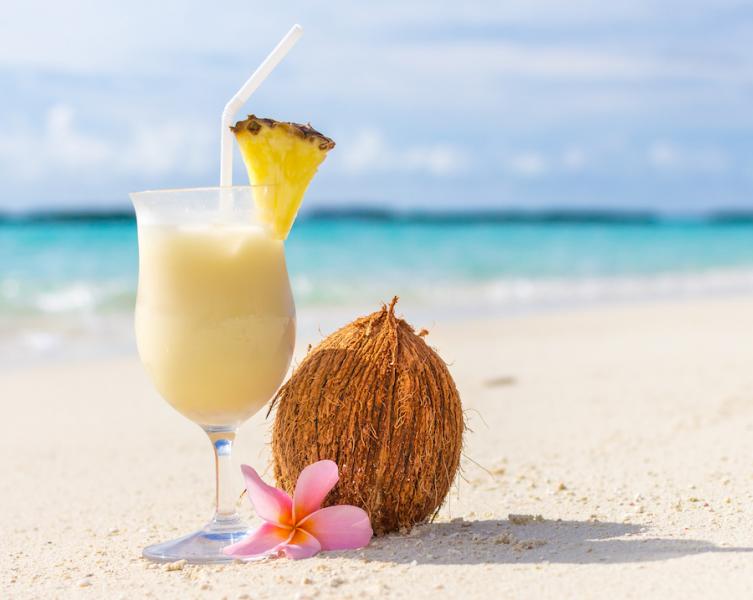 Have you been feeling a little stressed lately? If so, try imagining an escape to a tropical beach where you can lay back and relax sipping a pina colada while soaking up some sunshine. And while you might not be able to escape to the islands right now, you can make yourself a relaxing kava kava pina colada. I’ve been making one and drinking some every night this past week and it has really helped me relax, sleep better and feel calmer.
Have you been feeling a little stressed lately? If so, try imagining an escape to a tropical beach where you can lay back and relax sipping a pina colada while soaking up some sunshine. And while you might not be able to escape to the islands right now, you can make yourself a relaxing kava kava pina colada. I’ve been making one and drinking some every night this past week and it has really helped me relax, sleep better and feel calmer.
Kava kava is native to the South Pacific islands and its use may play a role in creating that mellow, laid back energy of the Polynesian people. If you’re stressed, worried, angry, tense and having trouble sleeping, kava kava might help you, too.
Kava kava is really an amazing herb. I first heard about it from Herbal Ed Smith, head of HerbPharm at a symposium of the American Herbalists Guild and I’ve been a fan of it ever since.
Kava is a shrub that can grow up to twelve feet high, but it is typically harvested around seven feet. The part used is the plant’s sprawling rhizomes, which can reach nine feet in length. It was introduced to the Western world by Captain James Cook, who collected it during his first voyage to the South Pacific (1768-1771). It is a relative of black pepper and its botanical name, Piper methysticum, means intoxicating pepper.
It was made into a beverage that was once reserved for chiefs and noblemen, but today many people in the islands consume it in the same way people drink tea, coffee or alcohol in other parts of the world. In fact, kava bars in Fiji are as common as coffee shops in America.
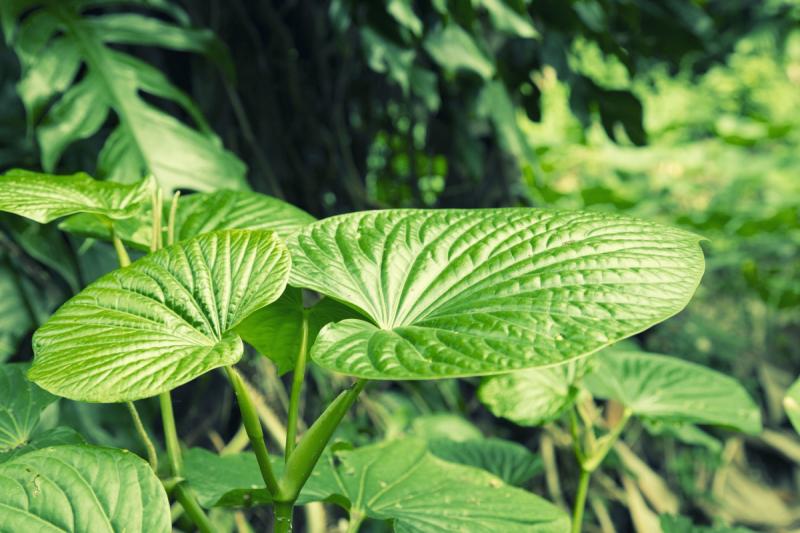 |
| Kava Leaves |
Relaxed But Alert
The lock-downs and other repercussions of the current crisis have caused increased drug and alcohol use, more people seeking medication for depression or anxiety, and an increase in family tensions (with more reports of abuse). I believe taking kava kava could help with all of these problems.
Kava kava promotes a sense of calmness, relaxation, and even a mild euphoria. Unlike alcohol, kava helps a person feel good without dulling their senses or losing self-control. People drinking kava don’t become angry, noisy, unpleasant or quarrelsome. Kava does not cause the drinker to lose consciousness and does not result in after affects like hangover.
Kava enhances communication and increases feelings of empathy. In fact, it has reported that you can’t feel hate after drinking kava. So, it has been traditionally used to help settle quarrels. In Polynesia, it is common for marriage counselors to have a kava ceremony before counseling to get everyone relaxed and in a good mood. Ceremonial consumption of kava kava has also been used to begin treaty negotiations, political meetings and business dealings.
Besides being relaxing and stress-reducing, kava is also a euphoric, which means it causes euphoria or a sense of well-being. This is where it’s connection to the endocannabinoid system comes in. Anandamide is an endocannabinoid that works with CB1 receptors in the brain and has been called the bliss molecule. It appears that some kavalactones may be working on this same system, which helps to bring balance to neurological functions in the brain.
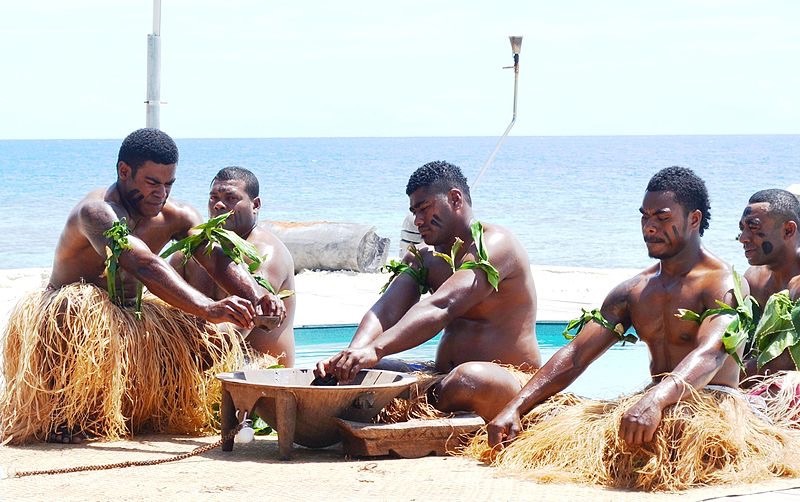 |
| Polynesians making Kava by aejay77 CC BY-SA |
Traditionally, kava has been used as a plant for acquiring inner knowledge and wisdom, in other words, the ability to know oneself. Fijian spiritual healers (called dauvagunu, which literally means "the expert in drinking kava") got their power by strategically using kava to gain access to the Vu (a spirit force) when a patient requests help. Taking kava, the dauvagunu gained greater powers of perception and insight.
It appears that high-quality kava has the ability to suspend a person’s perpetual mental chatter for a period of time, stopping the incessant stream of thinking and giving the mind a true rest. While relieving tension in the muscles, kava also gives access to the subconscious, so the source of the tension, and in some cases pain, may be discovered and dismissed.
From a practical perspective, kava allows the mind to remain sharp, while the body feels relaxed. It helps you relax and become mentally calm. It promotes restful sleep which replenishes energy, making it a better remedy for fatigue than stimulants like caffeine. It can lift the mood in depression caused by stress, or calm anxious feelings. All of this makes it a perfect remedy for today’s stressful circumstances.
Kava kava does not make you high the way recreational drugs do. It does not force a person into an altered state of consciousness, but simply creates a more peaceful and aware state of mind. Given these facts, it would be nice if more people turned to kava for help with their troubles and tension instead of alcohol, marijuana and other recreational drugs.
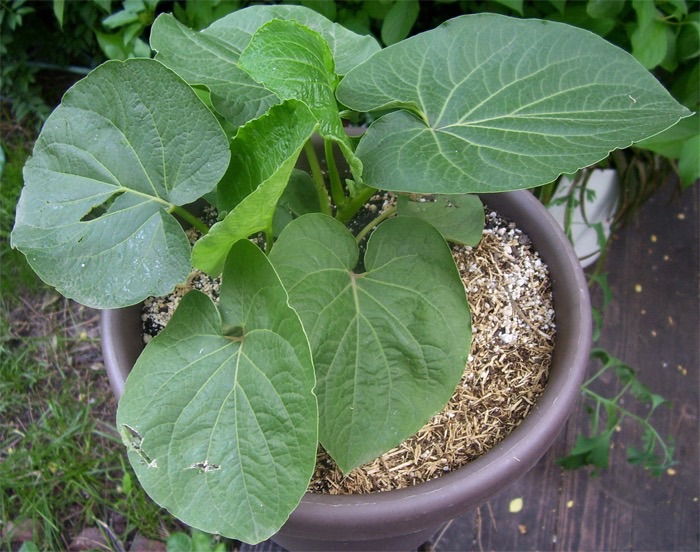 |
| Kava Plant from Wikipedia Commons |
How Kava Works
Kava contains compounds called kavalactones, which influence the emotional command center of the brain producing both psychological and physical effects. Kavalactones have been shown to relieve anxiety and pain in laboratory animals. In humans, they have been shown to change brain activity without sedation (dulling thought processes). New research suggests they may interact with CB1 receptors in the endocannabinoid system.
Research has isolated fifteen lactones from kava rootstock, five of which bear the following characteristics: The lactones kawain and dihydrokawain are muscle relaxants, analgesics and sedatives; dehydrokawain and dehydromethysticin are spasmolytic; and yangonins are used against symptoms of neurological dysregulation and difficulties in concentrating and memory loss.
A number of compounds referred to as Kava pyrones (kawain, dihydrokawain, methysticin, and dihydromethysticin) are said to have mild sedative and tranquilizing effects. Kawain is sold in Europe as a mild sedative for the elderly. Extracts of kava, and most of the kava pyrones have been shown to have antiseptic properties in test-tube experiments.
An interesting characteristic of kava is that its effectiveness does not stem from a single active substance but rather from a mixture (or a blend) of several kavalactones. Each kavalactone greatly depends on the presence of the others to produce kava’s effects. In fact, kava’s unaltered extracts produce more potent psychoactive results than do any single isolated substance.
A 1993 report in the British Journal of Phytotherapy referred to kava as one of few herbs that can safely relax skeletal muscles. The author of this report prescribed it for nervous tension and conditions associated with skeletal muscle spasms, such as headaches caused by a tense neck. Another study showed that those taking kava had an improved sense of well-being and marked reduction in nervousness and tension compared to those on a placebo.
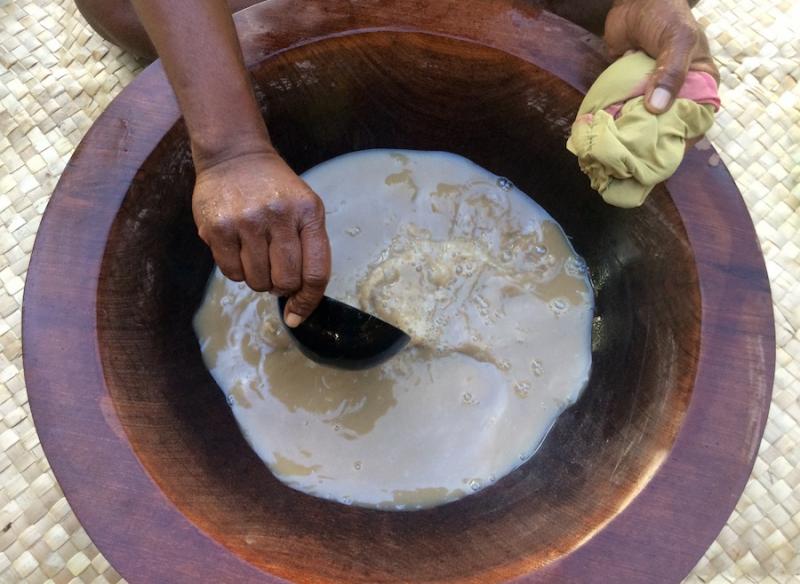
Powerful Antispasmodic and Analgesic
Kava is one of the best herbal antispasmodics we have. It can be used in a manner similar to lobelia to ease muscle tension, cramping, and pain. Like lobelia, it can be used for panic attacks, anxiety attacks, asthma and whooping cough.
It is used in Europe to treat menstrual cramps, and can ease other tension-related conditions, including back pain, neck spasms, headaches, and renal colic (spasms in the urinary system). I have personally found that kava kava taken with magnesium relaxes tension in my body better than any other remedy I’ve found.
It is also excellent as a remedy for insomnia caused by stress, tension, or pain. It promotes more restful sleep, with long, vivid dreams, and helps a person wake up more refreshed.
If you chew on kava root, you will notice that it numbs your tongue. This is because kava contains a potent topical analgesic. It contains two pain-relieving chemicals, dihydrokavain and dihydromethysticin. These chemicals are as effective as aspirin, according to Albert Leung, Ph.D and Arkansas herbalist Steven Foster in their book The Encyclopedia of Common Natural Ingredients. Kava can be applied to wounds or chewed to ease toothache pain, sore throat, sore gums and canker sores.
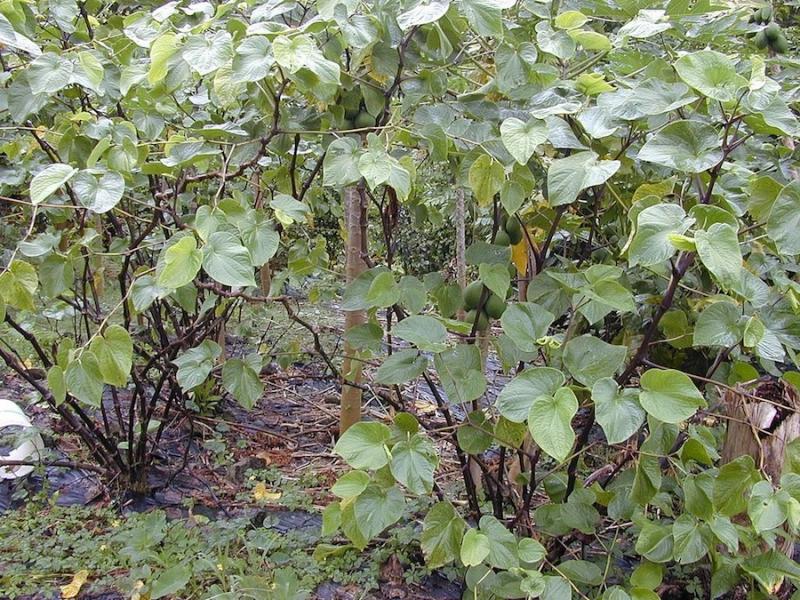 |
| Kava Bush Forest & Kim Starr CC BY 3.0 |
Other Uses for Kava
A less well-known use for kava is as a urinary remedy. Internally, it is particularly helpful for easing pain associated with the passage of kidney stones and painful urination. It is a mild diuretic with antiseptic properties that help fight urinary tract infections. I find drinking kava at night helps prevent me waking up at night to use the restroom. It also eases difficult urination associated with prostate swelling.
In many parts of the South Pacific, it was generally thought that regular, judicious use of kava has a positive impact on overall health. It is used in many cultures, for example, as a remedy for fatigue. So, instead of trying to overcome fatigue by jacking one’s system up on stimulants like caffeine, one relaxes the system, resulting in better sleep, less muscle tension and a more relaxed but energized state.
Kava is valued as a cure for rheumatism, worms, obesity and neuralgia. It is considered safe enough to give to children who are weak and recovering from illness. It eases teething pains and crying spells. Kava has also been applied topically as a remedy for fungal infections like athlete’s foot and thrush. It cures ringworm and is great for soothing stings and skin inflammations, including leprosy.
Kava has been found to inhibit gonorrhea. The number of low incidences of gonorrhea in kava-drinking populations has been substantially documented.
In Chinese medicine, kava is a powerful heart medicine, increasing blood and qi flow without increasing the heart rate. In 1985, Japanese newspapers said kava was an effective remedy for the common cold because it induces sweating.
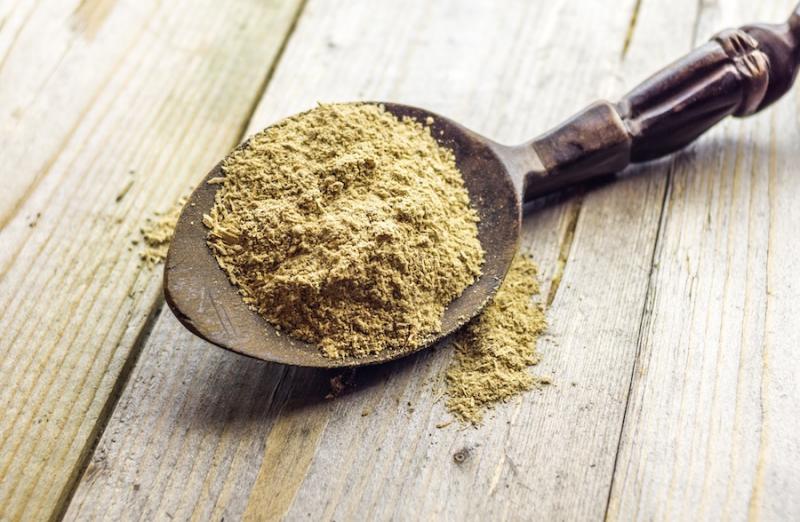
Taking Kava Kava
Kava has an acrid taste that is somewhat astringent, biting and numbing, which is not pleasant to most Westerners. It’s an acquired taste, but then so are coffee and beer. Still, in the United States and Europe it is typically used in capsule form to avoid the taste. Usually these capsules are a standardized extract of the kavalactones.
Kavalactones are not water soluble, so you can’t make a tea from it. Traditionally kava was prepared by chewing the root and spitting it into a bowl. The saliva extracted the kavalactones that could be made into a beverage. It also made the beverage more intoxicating.
Unless you want to chew the root yourself I'd recommend getting a tincture or glycerite. I’ve used kava tincture and made kava glycerite, neither are pleasant tasting.
Herbalists sometimes hold kava parties at herb conferences and use coconut milk, a fatty substance, to help dissolve the kavalactones into a liquid form. Which brings me to the kava kava pina colada. The blend I created for myself is:
- 16 oz. pineapple juice
- ½ can of coconut milk
- 1-2 Tablespoons of kava kava powder (depending on how strong you want it)
- 1-2 Tablespoons of xylitiol
- 1 tray of ice cubes
I add it all to my blender and mix it all together. I’ve been drinking about 1 cup each night before bedtime, storing the extra in the fridge. You have to shake it up before drinking it as it tends to separate. I've found it to be a very relaxing nightcap.
If you’re taking capsules of the standardized extract, here are some suggestions. For anxiety, mild depression, pain, muscle tension or tension headaches, take 1 capsule with a meal twice daily. Take 1–2 capsules 30 minutes before bedtime for insomnia. For muscle cramps take 1-2 capsules with 200-400 mg. of magnesium every two hours until cramps subside. (If this hasn’t worked after 3-4 doses, muscle tension isn’t the problem, something else is wrong, and you need to figure out what the real problem is.)
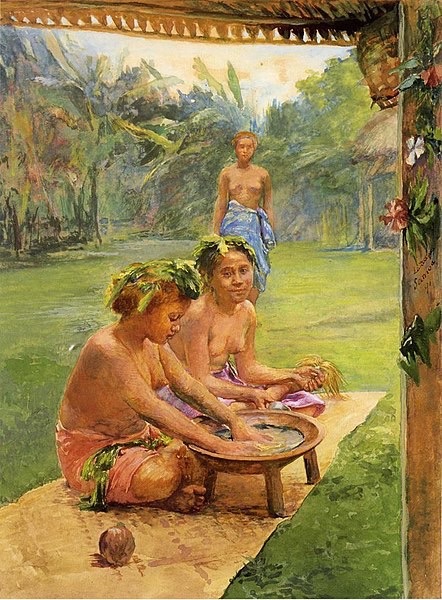 |
| Painting of traditional kava preparation by John La Farge |
Kava Kava Safety
In spite of the many benefits of kava kava and its long history of safe use, it has had some bad press. There were reports from Europe that kava was causing liver damage. It appears that European manufacturers were making extracts of kava from the stems instead of the roots. Native people consider the stems toxic.
In spite of the safety of kava, I do suggest you observe the following precautions. First, do not use kava kava while driving a motor vehicle or operating machinery. Although it leaves your mind alert, it can relax your muscles to the point that your reaction time will be slowed. There are people who have been arrested for drunk driving after using kava here in Utah. In fact, you can actually taken enough that you’ll be so relaxed you won’t be able to move a muscle until the kava starts to wear off.
Avoid kava if you have liver problems, frequently use alcohol or take any medication that can damage the liver. However, the liver is far more likely to be damaged by alcohol, acetaminophen (Tylenol) and prescription drugs (like cholesterol-reducing statins) than it is from kava.
Even though I know of no harmful effects, as a precaution, I'd recommend avoiding kava if you’re pregnant or nursing.
At lower doses, negative effects are rare, but some people might experience mild stomach upset or allergic skin reactions in the form of a dry, itchy rash. The rash sometimes happens in Polynesians who have drunk kava daily for many years, but disappears with a few days after the herb is discontinued.
If kava is taken at higher that the recommended doses for a prolonged period, your skin and nails may turn yellow temporarily. If this happens, simply stop taking kava for a few days until they clear up. Again, these symptoms show up very rarely and only in people who use kava excessively for long periods of time.
Selected References
- Kava A Safe Herbal Treatment for Anxiety by Kerry Bone, Master Herbalist (Townsend Letter for Doctors, June 1995).
- Kava Kava: The Pacific Herb by Mark Blumenthal (Whole Foods, April 1996).
- Kava Medicine Hunting in Paradise by Chris Kilham. (Rochester, Vermont: Park Street Press, 1996).
- Kava Root: Traditional Euphoric & Modern Pharmaceutical by Ed Smith, (7th Annual AHG Symposium: June 7-9, 1996).
- The Green Pharmacy by James A. Duke, Ph.D. (Emmaus, PA: Rodale Press, 1996).
- The Medicinal and Spiritual Properties of Kava by Bill Brevoort (NFM’s Nutrition Science News, April 1996).
- The Way of Herbs by Subhuti Dharmananda, Ph.D. (Denver, CO: Washington Square Press, 1980).
- Kava Kava by American Herbal Council Herbal Medicine Commission E Monographs.
Steven's Articles
-

-
Teasel
A traditional herb for healing injured bones and…
-

-
Barberry and Healthy Personal Boundaries
A thorny shrub for fighting infections and supporting…
December
-

-
The Evidence for Berberine
A yellow alkaloid found in traditional infection-fighting…
-

-
The Sensible Use of Caffeinated Herbs
Kola nuts, guarana, and yerba mate and other herbs…
-

-
The Health Benefits and Problems with Coffee
This popular caffeinated beverage can be beneficial…
October
-

-
Understanding Caffeine & Cellular Adaptation
Preserving the power of caffeine's buzz and the…
September
-

-
Horseradish
A pungent spice for aiding protein metabolism…
-

-
Banaba or Crepe Myrtle
A beautiful tree from Southeast Asia whose leaves…
August
-

-
Monkeyflowers
Flower essences to help see ourselves more clearly…
-

-
Mariposa Lilies
Strengthening the bond between mother and child…
-

-
The Noble Bay Leaf
A common kitchen herb for aiding digestion and…
-

-
Epimedium: Horny Goat Weed
A circulatory stimulant and kidney yang tonic…
July
-

-
The Medicinal and Nutritional Benefits of Apricots
A nutritious fruit and valuable medicinal seed for coughs
-

-
Dogwoods
Asian dogwood is used to stop excessive discharge,…
June
-

-
Neem: The Village Pharmacy
A popular Ayurvedic remedy for dental and immune…

